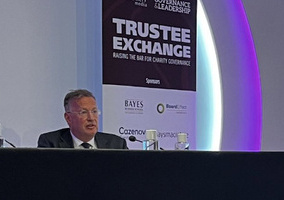Campaigning guidance for charities has not changed, the regulator has said, after some in the sector expressed concern over new advice it has issued.
One sector lawyer said the Charity Commission’s five-minute guide, published yesterday, “appears to be sowing the seeds of confusion by providing contradictory advice” to the longstanding guidance on which it is based.
Meanwhile, charities and umbrella bodies have reaffirmed their right to engage in political activity following the guide's publication and Commission chair Orlando Fraser's speech yesterday.
Some in the sector disagreed with the tone of Fraser's speech, in which he said trustees should consider whether undertaking political activity was “the prudent thing to do” and urged them to campaign “with tolerance and kindness”.
Guide ‘seems to introduce new content’
Writing in a blog, Rosamund McCarthy Etherington, partner at Stone King, raised concern over the new advice that charities must “consider the impact of [their] political activity on the charity’s assets including its reputation, especially when it might attract significant public interest or criticism”.
The guide adds: “The potential for criticism can be mitigated by the charity ensuring that it conducts its activity with respect and tolerance.”
McCarthy Etherington wrote that this appears to contrast with the previous guidance, which states that charities may wish to undertake an “emotive campaign” that “poses significant risks because of the potential benefits the campaign might bring”, including changing government attitudes.
Former director of external affairs at the Association of Charitable Foundations, Richard Hebditch also posted on social media that the five-minute guide “seems to introduce new content into it”, referencing the passage on considering potential impact on a charity’s reputation.
But a Commission spokeswoman said in response: “The [five-minute] guide does not imply any new duty on trustees, and is instead intended as an additional tool to help charities navigate what can be a tricky area.
“Our longer form guidance still stands, and we do not consider the shorter guidance is inconsistent with it.”
‘Charity leaders must feel safe to campaign’
Roberta Fusco, ACEVO's head of influencing, said charity leaders “have always had a duty to manage” the reputational risk of their campaigning activities and rebuffed Fraser's advice that charities must show 'prudence'.
“A charity’s right – and duty in some cases – to engage in political activity and campaigning to support their purpose is enshrined in law and history bears witness to the many advances in public policy that this activity has helped achieve,” she said.
“Public debate is a sign of a healthy democracy, and a healthy democracy needs engaged civic participation and challenge, which is not always welcome (nor necessarily considered ‘prudent’) by those who disagree. However, the risk is for charity leaders to manage and balance against their charitable purpose, backed by fair and effective regulation.
“Charity leaders must feel safe in undertaking their legal obligation on behalf of the people and causes they support and the emphasis on the independence of the Charity Commission in yesterday’s speech is very welcome.”
Speaking at an event yesterday, NCVO chief executive Sarah Vibert disagreed with Fraser’s focus on “tolerance and kindness”.
“I completely reject that because the suffragettes were not tolerant or kind, but we got votes for women and there are lots of other examples like that in history,” said Vibert, at the event organised by NPC.
Regulatory tone is ‘intimidating’
Other charity sector speakers at the NPC event disagreed with the tone of Fraser’s speech.
Paul Parker, recording clerk for British Quakers, said the regulator’s tone was “shifting from enabling people to campaign well and legally to intimidating people into not campaigning at all”.
“We shouldn't any longer be tolerating a situation where in order to benefit the people we are set up to benefit, we have to be polite and take an Oliver Twist approach to getting what we need. We are going to have to be louder and more forceful, I think, in what we're saying,” he said.
Parker said the atmosphere around charity campaigning was “pretty hostile” and that “lots of our tools for successful campaigning are either being taken away from us or under threat”.
Meanwhile, Antonia Bance, head of campaigns at Trade Unions Congress, urged charities to “be brave” and campaign “without fear or favour”.
“As charities and charity trustees, we have to believe that any government, that any minister and any decision maker or policymaker can make the right decision. Every decision-maker can make a better decision and you have the opportunity to persuade them of that,” she said.
Related articles











